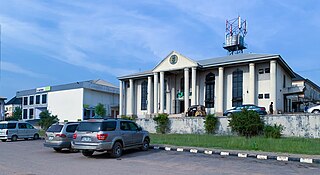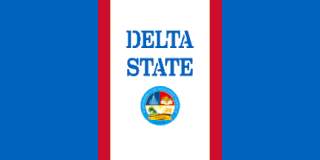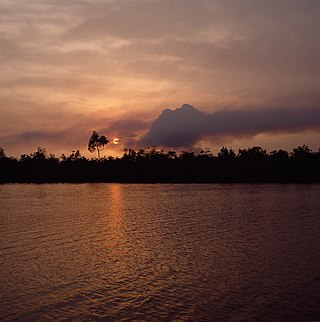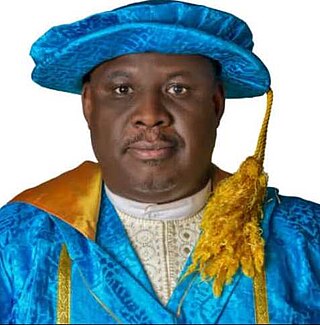Related Research Articles

The Ijaw people, otherwise known as the Ijo people, are an ethnic group found in the Niger Delta in Nigeria, with significant population clusters in Bayelsa, Delta, and Rivers. They also occupy Edo, Ondo, and small parts of Akwa Ibom. Many are found as migrant fishermen in camps as far west as Sierra Leone and as far east as Gabon. They account for about 1.8% of the Nigerian population according to CIA Factbook. The Ijaws are one of the most populous tribes inhabiting the Niger Delta region and the eighth largest ethnic group in Nigeria.

Onitsha is a city on the eastern bank of the Niger River, in Anambra State, Nigeria. A metropolitan city, Onitsha is known for its river port and as an economic hub for commerce, industry, and education. It is one of the largest metropolitan area in Nigeria with a fast growing population of over 8 million people. It hosts the Onitsha Main Market, the largest market in Africa in terms of geographical size and volume of goods. Onitsha and neighboring Asaba on the western bank of the Niger River form a continuous metropolitan area.

Delta State is a state in the South-South geopolitical zone of Nigeria. Named after the Niger Delta—a large part of which is in the state—the state was formed from the former Bendel State on August 27, 1991. Bordered on the north by Edo State, the east by Anambra and Rivers states, and that south by Bayelsa State while to the west is the Bight of Benin which covers about 160 kilometres of the state's coastline. The state was initially created with 12 local government areas in 1991 which was later extended to 19 and now has 25 local government areas. Asaba as its state capital located along the River Niger on the northeastern end of the state, while the state's economic center is Warri on the southwestern coastline.

Bayelsa is a state in the South South region of Nigeria, located in the core of the Niger Delta. Bayelsa State was created in 1996 and was carved out from Rivers State, making it one of the newest states in the federation. The capital, Yenagoa, is susceptible to high risk of annual flooding. It shares a boundary with Rivers State to the east and Delta State to the north across the Niger River for 17 km and the Forçados River for 198 km, with the waters of the Atlantic Ocean dominating its southern borders. It has a total area of 10,773 square kilometres (4,159 sq mi). The state comprises eight local government areas: Ekeremor, Kolokuma/Opokuma, Yenagoa, Nembe, Ogbia, Sagbama, Brass and Southern Ijaw. The state is the smallest in Nigeria by population as of the 2006 census. Being in the Niger Delta, Bayelsa State has a riverine and estuarine setting, with bodies of water within the state preventing the development of significant road infrastructure.
Yenagoa is a Local Government Area and capital city of Bayelsa State, Southern Nigeria. It is located at the Niger-Delta region of the country at coordinates 4°55′29″N6°15′51″E.
Environmental issues in the Niger Delta are caused by its petroleum industry. The delta covers 20,000 km2 (7,700 sq mi) within wetlands of 70,000 km2 (27,000 sq mi) formed primarily by sediment deposition. Home to 20 million people and 40 different ethnic groups, this floodplain makes up 7.5% of Nigeria's total land mass. It is the largest wetland and maintains the third-largest drainage basin in Africa. The Delta's environment can be broken down into four ecological zones: coastal barrier islands, mangrove swamp forests, freshwater swamps, and lowland rainforests. Fishing and farming are the main sources of livelihoods for majority of her residents.
The Niger Delta Development Commission (NDDC) is a federal government agency established by Nigerian president Olusegun Obasanjo in the year 2000 with the sole mandate of developing the oil-rich Niger Delta region of Nigeria. In September 2008, President Umaru Yar'Adua announced the formation of a Niger Delta Ministry, with the Niger Delta Development Commission to become a parastatal under the ministry. One of the core mandates of the commission is to train and educate the youths of the oil rich Niger Delta regions to curb hostilities and militancy, while developing key infrastructure to promote diversification and productivity.

In Nigeria, there has been a major progress in the improvement of health since 1950. Although lower respiratory infections, neonatal disorders and HIV/AIDS have ranked the topmost causes of deaths in Nigeria, in the case of other diseases such as monkeypox, polio, malaria and tuberculosis, progress has been achieved. Among other threats to health are malnutrition, pollution and road traffic accidents. In 2020, Nigeria had the highest number of cases of COVID-19 in Africa.

Amuwo-Odofin is a local government area (LGA) in the Badagry Division, Lagos State, Nigeria.
The Ministry of Niger Delta Affairs is one of the Federal Ministries of Nigeria. It focuses on the infrastructural development, environmental protection and empowerment of youths in the oil rich Niger Delta region.

Cross River is the main river in southeastern Nigeria and gives its name to Cross River State. It originates in Cameroon, where it takes the name of the Manyu River. Although not long by African standards its catchment has high rainfall and it becomes very wide. Over its last 80 kilometres (50 mi) to the sea it flows through swampy rainforest with numerous creeks and forms an inland delta near its confluence with the Calabar River, about 20 kilometres (12 mi) wide and 50 kilometres (31 mi) long between the cities of Oron on the west bank and Calabar, on the east bank, more than 30 kilometres (19 mi) from the open sea. The delta empties into a broad estuary which it shares with a few smaller rivers. At its mouth in the Atlantic Ocean, the estuary is 24 kilometres (15 mi) wide. The eastern side of the estuary is in the neighboring country of Cameroon.

Climate change is a critical issue in Bangladesh as the country is one of the most vulnerable to the effects of climate change. In the 2020 edition of Germanwatch's Climate Risk Index, it ranked seventh in the list of countries most affected by climate calamities during the period 1999–2018. Bangladesh's vulnerability to the effects of climate change is due to a combination of geographical factors, such as its flat, low-lying, and delta-exposed topography, and socio-economic factors, including its high population density, levels of poverty, and dependence on agriculture. The impacts and potential threats include sea level rise, temperature rise, food crises, droughts, floods, and cyclones.
Adesuwa Obasuyi is a Nigerian environmentalist, climate change advocate, and the initiator of Sustainable Africa Cities and Communities Initiative - an environmental non-governmental organization that focuses on waste, and waste data management in Nigeria and Africa. She currently works as the Climate Change Policy Manager at the British High Commission, Abuja.

Sustainable Development Goal 13 is to limit and adapt to climate change. It is one of 17 Sustainable Development Goals established by the United Nations General Assembly in 2015. The official mission statement of this goal is to "Take urgent action to combat climate change and its impacts". SDG 13 and SDG 7 on clean energy are closely related and complementary.

Sustainable Development Goals and Nigeria is about how Nigeria is implementing the Sustainable Development Goals within the thirty-six states and its Federal Capital Territory (FCT). The Sustainable Development Goals (SDGs) consist of seventeen global goals designed as a "blueprint to achieve a better and more sustainable future for all". Each of the 17 goals is expected to be achieved by 2030 in every country around the world.

Bashiru Aremu is a Nigerian academic and professor of computer science, Information and Communication Technology. He is the vice chancellor of Crown University International Chartered.
Nigeria Youth SDGs Network which is registered as the Network of Youth for Sustainable Initiative is a youth led and youth serving civil society organization localizing the United Nations Sustainable Development Goals launched in April 2017.

Aliyu Salisu Barau is a Nigerian academic and a full professor of Urban and Regional Planning at Bayero University Kano. He is the Dean of the Faculty of Earth and Environmental Sciences at Bayero University Kano and the West Africa Hub Director of the Urban Climate Change Research Network (UCCRN), affiliated with the Earth Institute, Columbia University. He is also a Chartered Town Planner of the UK's Royal Town Planning Institute (RTPI).

Virtual Singapore is a 3D digital model of Singapore that uses real-time and topographical data. It's a digital twin of the city-state, and the first digital twin of a country. Virtual Singapore is co-led by the National Research Foundation, the Singapore Land Authority (SLA) and the Government Technology Agency. The Government of Singapore used Dassault Systèmes' 3DEXPERIENCE City to create the digital model.

Aishworya Shrestha is a Nepalese pageant titleholder as Miss Grand Nepal 2022. She represented Nepal in Miss Grand International 2022. She is a Nepali social worker and activist known for her work in establishing impactful grassroots programs related to mental health, education, women's empowerment, and civic engagement.
References
- ↑ Admin (29 January 2023). "HOW I DISCOVERED A CAREER IN GIS". Story Maps. Retrieved 5 February 2024.
- ↑ "In oil-rich Niger Delta, coastal erosion frustrates locals endlessly". Al Jazeera. Retrieved 2024-02-05.
- ↑ "Nigeria: Improving preparedness for communities through early warning | PreventionWeb". www.preventionweb.net. 2022-06-10. Retrieved 2024-02-05.
- ↑ "Catholics in Nigeria are planting trees to combat the effects of climate change". America Magazine. 2023-06-01. Retrieved 2024-02-05.
- ↑ NGYouthSDGs (2022-06-05). "World Environment Day: Six Young People Advocating for a Sustainable Future and Healthier Climate in Nigeria". Nigeria Youth SDG. Retrieved 2024-02-05.
- ↑ "How climate change is wreaking havoc on communities in Niger Delta". www.downtoearth.org.in. Retrieved 2024-02-05.
- ↑ Magazine, Undark (2023-05-04). "Mapping Flood Risk for Nigeria's Internally Displaced People". Undark Magazine. Retrieved 2024-02-05.
- ↑ Admin (14 June 2021). "Spotlight: Nigerian researcher develops web app for reporting flood". Thecable.ng.
- ↑ "Geospatial World 50 Rising Stars 2022". www.geospatialworld.net. Retrieved 2024-02-05.
- ↑ NGYouthSDGs (2022-06-05). "World Environment Day: Six Young People Advocating for a Sustainable Future and Healthier Climate in Nigeria". Nigeria Youth SDG. Retrieved 2024-02-05.
- ↑ Admin. "Taiwo Ogunwumi". Research Gate. Retrieved 5 February 2024.